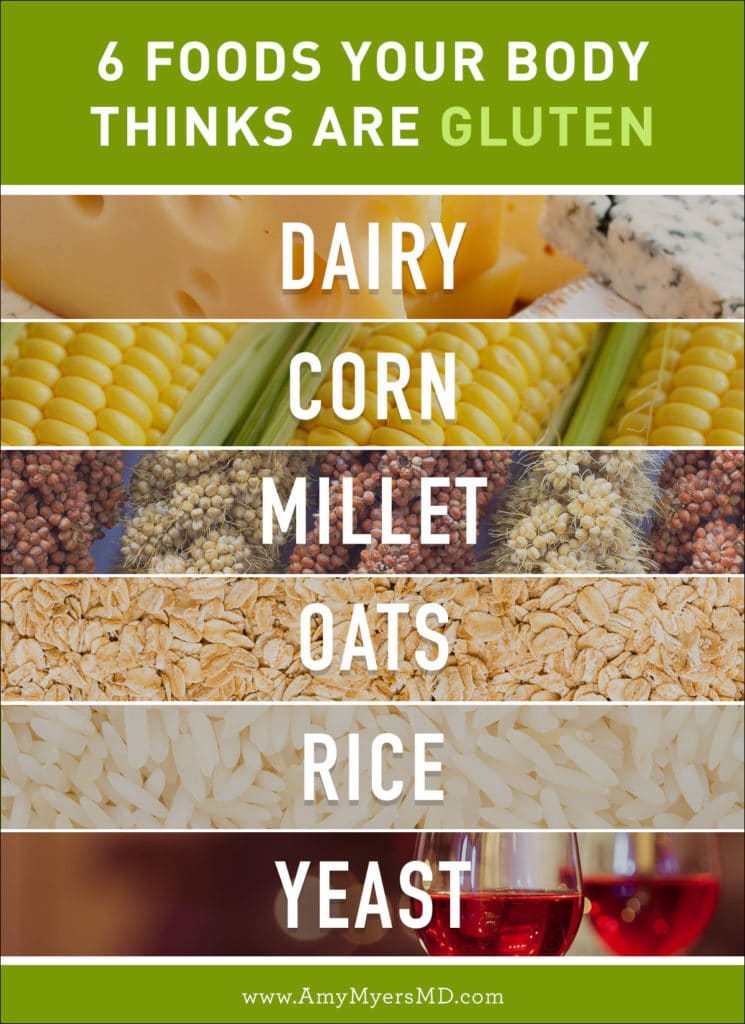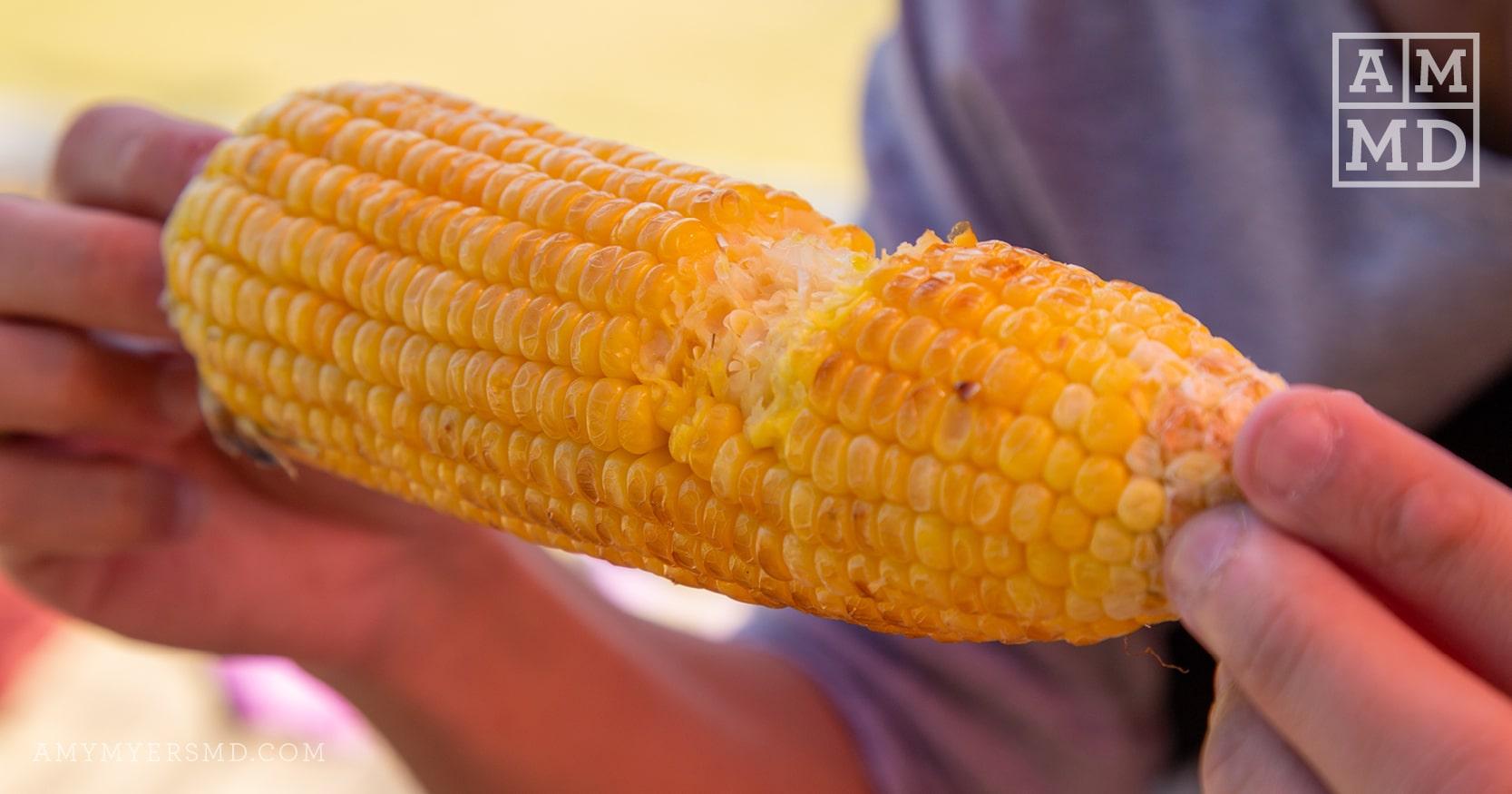Gluten cross-reactive foods may be the surprising root cause of your symptoms! If you are diligently following a gluten-free diet yet still experiencing symptoms of gluten exposure such as brain fog, headaches, digestive issues, rashes, weakness, joint pain, swelling, or fatigue then gluten-cross reactivity just might be the issue.
Did you know that there are foods that your body might think are gluten? It’s true! The process is called gluten cross-reactivity. If you eat gluten cross-reactive foods, you may feel all the symptoms of getting “glutened” even if gluten didn’t pass your lips!
In this article, I’ll explain in depth what gluten cross-reactivity is, and share the top gluten-cross reactive foods. Then I’l describe how to tell if it’s causing your symptoms, and what you can do about avoiding gluten cross-reactive foods.
Before we dive in, let me quickly share a tip with you: Complete Enzymes! These digestive enzymes are not a pass to eat anything and everything, yet they’re a huge help in recovering from an occasional “glutening.”
Now. let’s recap why gluten can be so damaging.
What’s so Bad About Gluten?
There are two main reasons why you want to avoid gluten, as well as any gluten cross-reactive foods.
1. Gluten Causes Leaky Gut
When you eat gluten in a piece of bread, in your lunch meats, or in any of the many hidden sources, it travels through your stomach and arrives in your small intestine. We know from the research of Dr. Alessio Fasano1 that gluten then triggers the release of zonulin. Zonulin is a chemical that signals the tight junctions of your intestinal wall to open up, creating intestinal permeability, or leaky gut.
Think of your gut lining as a drawbridge. Teeny tiny boats (micronutrients in food) go under the bridge without a problem. However, when gluten prompts your body to release zonulin, it causes the drawbridge to go up. Bigger boats that were never meant to travel through now have a clear passage. In the case of your gut, it’s microbes, toxins, proteins, and partially digested food particles that pass under the drawbridge, escape into your bloodstream, and travel throughout your body
As all of the toxins, microbes, and food particles such as gluten and gluten cross-reactive foods flood your bloodstream, your immune system marks them as dangerous invaders. It creates inflammation to get rid of them, which leads us to point number two.
2. Gluten Causes Inflammation
Inflammation is your immune system’s natural response to anything it deems dangerous. That could be a cut, a virus, gluten, or gluten cross-reactive food that slipped through your leaky gut. One percent of the population has celiac disease and one in 30 people have a gluten sensitivity. Yet, eating gluten and gluten cross-reactive foods doesn’t just cause inflammation in people with celiac disease and gluten intolerance. The inflammation that stems from a leaky gut caused by gluten and gluten cross-reactivity can happen to anyone.
When your immune system continuously creates inflammation in response to the microbes and toxins flooding your bloodstream through leaky gut caused by gluten and gluten cross-reactive foods, you can develop chronic inflammation. Your immune system becomes overworked. It is less able to attack pathogens and invaders with precision.
Instead, it begins indiscriminately sending wave after wave of attack. This may begin with gluten cross-creative foods. However, eventually, your body’s own tissues can end up on the receiving end of the attack, leading to autoimmune disease. The only way to give your immune system the break it needs to regain its precision is to avoid gluten and gluten cross-reactive foods entirely.
That last word — entirely — is important. Recent research has shown that eating gluten can elevate your gluten antibodies for months.1 So, even if you only ate gluten four times a year, you could be in a state of inflammation year-round. And, at least until your leaky gut is healed and your inflammation has subsided, you’ll also need to avoid gluten cross-reactive foods because your body can’t tell the difference.
How Does Gluten Cross-Reactivity Work?
Let’s dig deeper into this process. Your adaptive immune system makes antibodies. Antibodies target particular bad guys (antigens) that your immune system has decided are likely to do you harm. Once gluten gets tagged as an antigen (as it is in anyone with gluten sensitivity), your adaptive immune system makes antibodies to seek it out.
Unfortunately, your immune system’s recognition system isn’t perfect. As long as a molecule’s structure is similar enough to the one your antibodies are hunting, your immune system can register it as an invader as well.
So while on the hunt for gluten, those antibodies can wrongly tag other proteins as gluten. They recognize specific, short amino acid sequences that are also found in gluten. Your immune system then puts up its defenses, flooding your body with inflammatory chemicals. Your inflammation levels ratchet up.
Are Gluten-Cross Reactivity and Molecular Mimicry the Same?
This process of cross-reactivity is also the same concept as the molecular mimicry phenomenon. In both cases, your immune system confuses benign molecules as invaders and begins to destroy them. However, unlike in gluten cross-reactivity, in the case of molecular mimicry, your body (such as thyroid tissue in those with Hashimoto’s) is being misidentified and attacked.
For more information on how gluten cross-reactivity and molecular mimicry contribute to autoimmunity and thyroid dysfunction, check out my books, The Autoimmune Solution and The Thyroid Connection.
6 Gluten Cross-Reactive Foods
This gluten cross-reactivity happens most commonly with dairy products. That’s because casein, the protein found in dairy, is so similar to the gliadin protein found in gluten. In fact, it’s estimated that at least half of those who are gluten intolerant are also sensitive to dairy. If gluten is an issue for you, it’s likely gluten cross-reactivity will occur with dairy products as well.
Here are the six foods that your body can confuse with gluten because of their similar protein structure:
- Dairy products, such as milk and cheese
- Corn
- Millet
- Oats
- Rice
- Yeast
 Dr. Amy Myers
June 13th, 2017
https://content.amymyersmd.com/article/gluten-cross-reactive-foods/6 Foods Your Body Thinks Are Gluten – 6 Foods That Cross-react with Gluten – Infographic – Amy Myers MD®
Dr. Amy Myers
June 13th, 2017
https://content.amymyersmd.com/article/gluten-cross-reactive-foods/6 Foods Your Body Thinks Are Gluten – 6 Foods That Cross-react with Gluten – Infographic – Amy Myers MD®If you’ve been following the functional medicine or gluten-free community, you may recall that the list of foods believed to cross-react with gluten used to be much longer.
This was based on the fact that the primary lab test (based on research at the time) used to check for gluten cross-reactivity previously included 19 foods. However, new and more conclusive information and research have emerged demonstrating that the list is actually much narrower! The current best practices for lab testing for gluten cross-reactivity have been updated (more on that below).
How to Establish Which Foods Are Causing Your Gluten Cross-Reactivity
If you suspect that gluten cross-reactivity is causing your symptoms, there are two routes you can take to pinpoint which foods may be the culprit.
Option One: Elimination Diet for Gluten Cross-Reactive Foods
I find the best option is to use an elimination diet protocol. Remove the six common gluten cross-reactive foods for at least two months to see if your symptoms improve. Make sure you have healed your gut because you are often more sensitive to certain foods while your gut is leaky and your inflammation is high.
Then, after two months you can reintroduce the six foods one at a time. You’ll do this by eating each food three times a day for three days and monitoring to see if your symptoms return. If you do experience symptoms after reintroducing a food, you are likely experiencing gluten cross-reactivity.
Option Two: Lab Tests for Gluten Cross-Reactive Foods
Lab testing is the second option. I recommended that all of my patients who ditched gluten yet did not go grain, legume, and dairy-free take the Cyrex Array 4 gluten cross-reactivity test, This was particularly important for anyone with any type of autoimmunity. I also recommended this test for anyone who had eliminated gluten from their diet yet was still experiencing the symptoms that point to gluten cross-reactivity.
What to Do if You’re Experiencing Gluten Cross-Reactivity
If you determine that there are foods that are gluten cross-reactive for you, you will want to permanently remove them from your diet. Remember, even though the gluten cross-reactive foods do not actually contain gluten, your body thinks they do. Therefore, they can cause just as much inflammation and damage as eating actual gluten.
I never travel or dine-out without taking a bottle of Complete Enzymes along with me. While they’re not a “free pass” to eat all the gluten you want, they’re a big help when you’re dealing with an accidental exposure or gluten cross-reactivity.
I designed my Complete Enzymes for those of you with digestive issues, food sensitivities, and nutrient absorption challenges. These enzymes break down everything from protein and protein peptides, to carbohydrates, disaccharides and sugars. They even work on lipids/fats, and even vegetable fibers. In fact, I made certain to include DPP-IV. That’s a protease enzyme that actually breaks down gluten! So, if you are accidentally glutened, or experience gluten-cross-reactivity try Complete Enzymes. They can be a great support while you resolve the root cause of the problem.
For more information on the gut-thyroid connection, check out my interview with Alessio Fasano about the role of Zonulin on leaky gut and thyroid health.

